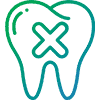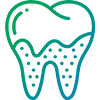Regular visits to the dentist are crucial for maintaining optimal oral hygiene, though they often don’t top the list of priorities for many. Dental cleanings, usually performed by an Oral Hygienist, play a pivotal role in removing plaque—a soft, sticky film teeming with bacteria—and tartar (or calculus, as it’s technically known) accumulations on the teeth.
These substances form over time due to saliva’s calcium content, which, while protective, also leads to calcium deposits. These can harden into tartar, providing a haven for bacteria near the gums if not removed. The cleaning process eliminates these deposits and polishes the teeth, creating smooth surfaces that hinder bacterial adhesion. Teeth cleaning enhances your ability to maintain oral cleanliness with regular home care and leaves your teeth feeling exceptionally soft and clean.

Reduce cavities

Brightens your smile

Prevent bleeding gums

Remove stains and brightens teeth
The dental cleaning procedure starts with a comprehensive mouth examination by a dental hygienist, employing a small mirror to identify any pressing concerns before the cleaning commences. This precedes the meticulous removal of plaque and tartar from the teeth’s surface, especially near the gum line, utilising specialised, non-invasive dental tools to ensure the process is painless and effective.
Advanced dental technology instruments are often the first tools used, applying tickling vibrations to dislodge larger tartar pieces, accompanied by a cooling mist of water to flush away debris and maintain a comfortable temperature. These instruments are designed to be gentle on the teeth. The hygienist can adjust the instrument’s settings in response to patient feedback to ensure comfort throughout the procedure.
Following the ultrasonic cleaning, finer hand tools, such as scalers and curettes, are employed to remove smaller tartar deposits meticulously and polish the tooth surfaces, ensuring they are smooth and clean.
The final steps involve polishing the teeth with a low-speed handpiece equipped with a soft rubber cup that spins to achieve a smooth, shiny finish. A fluoride treatment may also be applied, utilising gel or foam to strengthen the teeth. It is suggested that you avoid eating, drinking, or rinsing for 30 minutes post-application.
Scaling teeth is a safe and routine procedure that does not damage the tooth surface. A dental professional must do it. Scaling teeth involves removing tartar, plaque, and other debris from the teeth. This can help to prevent gum disease and tooth decay. Scaling teeth is usually done with a unique tool called a scaler. The scaler gently removes plaque and tartar from the teeth without harming the enamel. Scaling teeth is an essential part of maintaining good oral health. If you are concerned about scaling teeth, talk to your Cape Town dentist about whether it is right for you.
Scaling teeth is one way to achieve whiter teeth. Scaling involves using a scaler, which helps remove plaque and tartar from the teeth. Plaque is a sticky film of bacteria that can form on the teeth, and tartar is hardened plaque. Scaling can help remove these substances from the teeth, resulting in a whiter, brighter smile. A dentist or hygienist typically performs scaling, which may need multiple times to achieve the desired results. Scaling can be uncomfortable for some people, but it is generally not painful. It is also advisable to include a teeth whitening treatment for the brightest smile possible.
Contrary to common concerns, dental cleanings are generally pain-free, often described as causing a ticklish sensation rather than discomfort. Many enjoy the feeling of cleaning, appreciating the smooth sensation of their teeth afterwards. Should you experience any moments of dpain such as a brief zingy feeling, it’s typically fleeting and deemed manageable by most.
If you find the experience uncomfortable, it is important to communicate with your dentist or hygienist. They can offer various solutions to enhance your comfort during the cleaning. Discomfort can arise from several sources, such as exposed dentine (unpleasant but not harmful) or tender gums.
For those who’ve had uncomfortable cleanings, opting for a more gentle dental care provider like OptiSmile can significantly improve the experience. Additionally, topical numbing gels can provide relief if scaling is uncomfortable due to sensitive gums rather than the teeth, ensuring the cleaning process is as pleasant as possible.
An Oral Hygienist is a crucial healthcare professional within the dental sector. They specialise in the prevention of oral and dental conditions. Their primary role centres around performing professional teeth cleanings, an essential process for removing plaque, stains, and tartar.
Oral hygienists play a pivotal role in the early detection of tooth decay and gum diseases through thorough teeth cleaning. Their work extends beyond cleaning; they also assess oral health, help identify diseases and provide invaluable education on good oral hygiene practices.
By prioritising preventative care, oral hygienists assist individuals in maintaining optimal oral health, cementing their indispensable role in the dental healthcare team.
🍪 Cookies for a Better Visit, Not Cavities! 🍪
Our website uses cookies to enhance your user experience. These cookies won’t harm your teeth—promise! By continuing to browse, you agree to our Privacy Policy.